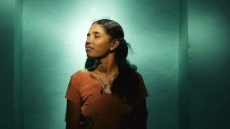TORONTO — The case of an 11-year-old Toronto girl who made headlines when she falsely claimed that a scissors-wielding stranger had cut her hijab highlights the complex ethical issues that arise when a child is thrust into the national spotlight, experts say.
Police said this week their investigation found the alleged incident didn't happen, just days after the girl and her family gave a detailed account during a high-profile news conference.
The allegations captured international attention and drew swift public condemnation from the prime minister and other officials — a situation that saw the girl's name and image splashed all over the news and social media.
Many media outlets, including The Canadian Press, have since chosen not to identify the girl. Some publications outside Canada, however, continued to use her name and photo even after the allegations were dismissed as false.
While the law doesn't automatically prevent anyone from naming an underage victim in a crime allegedly committed by an adult, there is a "strong moral and ethical" argument for protecting a child's identity, said Emma Rhodes, a Toronto lawyer who specializes in youth criminal justice.
"We protect children so that they can go on to become successful adults and with the internet as it is, by naming her, we are potentially harming her in becoming a successful adult," she said.
It is up to the adults in the girl's life, from her parents and police to media and observers, to put those safeguards in place, Rhodes said.
"It is our moral and ethical responsibility to let her be 11, to protect her because she's a child."
That the girl appeared alongside her parents, police and school officials — a "very unusual" occurrence — only muddied the waters, said Jeffrey Dvorkin, director of the journalism program at the University of Toronto's Scarborough campus.
There is a "pretty hard-and-fast" rule that journalists should not interview minors without parental consent, but in this case, the fact that her parents seemed on board normalized the situation, as did the comments made by politicians, he said.
Competition and pressure within the news industry also likely fuelled the rush to speak to the girl and her family, who may not have understood what they were getting themselves into, he said.

Nonetheless journalists have a responsibility to do their due diligence and to ensure their sources understand what's at stake, particularly when dealing with children, he said.
"This was a perfect storm of circumstances," Dvorkin said.
"Are we embarrassed for what the media did? Are we embarrassed for the child, which we should be? Are we embarrassed for the family that may not have understood the consequences of bringing their child out in that way?" he asked.
"This is such a layered story about culture and...journalism and the digital culture that drives all of this. It'll end up being, I think, a case study in journalism schools and in ethical studies."
A spokesman for the Toronto District School Board said the girl and her family were asked if they wanted to speak at Friday's news conference, which was held at the girl's school.
"The family members said they would speak to media and it was our understanding that this happened after, not before, they provided statements to police," Ryan Bird said in an email.
"Our motivation for commenting on the issue at the time was only out of compassion, care, concern and support — as did many elected leaders nationally, provincially and locally via interviews or social media."
Neither the girl nor her family have spoken publicly since police closed their investigation on Monday.





